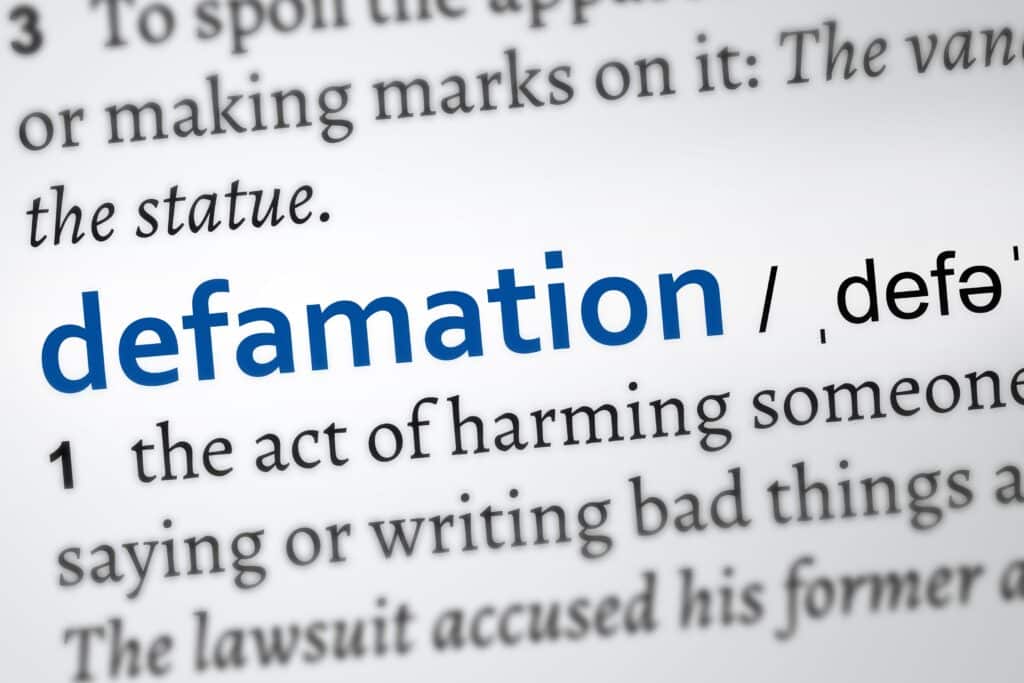What are the Criteria for Filing a Defamation Lawsuit in Japan? Explaining the Requirements and Average Compensation

Thanks to the advancements in the Internet, everyone can freely share their messages with the world. However, this freedom also poses social challenges, particularly the issue of defamation on the Internet. So, when does online defamation actually constitute legal defamation in Japan, making the person accountable?
In the following, we’ll focus on explaining the requirements for legal defamation in Japan.
What is a Defamation in Japan?

Defamation, in Japan, describes the act of unlawfully lowering the societal evaluation, such as the credibility or reputation, of a specific person to an unspecified or broad audience. If a case of defamation is established, the involved party can face civil liabilities under Japan’s Civil Code (Article 709) and might also be pursued for responsibilities related to the crime of defamation under Japan’s Penal Code (Article 230), potentially leading to criminal sanctions.
Legal Responsibilities in Civil and Criminal Defamation in Japan
In cases where defamation is established, you may face substantial legal consequences, both civil and criminal. The responsibilities involved differ between civil and criminal lawsuits.
In a civil lawsuit, if a court acknowledges your liability for infringing upon someone’s rights under Article 709 of the Japanese Civil Code, you’ll need to compensate for damages, including emotional distress and investigation costs. Beyond financial compensation, you might also be required to take corrective actions like publishing an apology advertisement to restore your reputation, as outlined in Article 723 of the same Code. If the defamation occurred online, you might also have the duty to remove offending blog posts or articles.
In a criminal lawsuit, you might be prosecuted under Article 230 of the Japanese Penal Code for the crime of defamation. The penalties can include imprisonment for up to three years or a fine of up to 500,000 yen. It’s worth noting that this offense is categorized as a “complaint required crime” under Article 232 of the Penal Code, meaning that legal action can only commence if the victim files a formal complaint. This is because pursuing the case could further damage the victim’s reputation.
Average Compensation for Emotional Distress
If a court recognizes the need for damage compensation in a civil lawsuit, the victim can demand a payment for emotional distress from the offender.
The typical amounts for such payments can vary widely depending on several factors, including the attributes of the victim and the nature of the defamation. While it is case-by-case, high-profile individuals often receive around 1 million yen, whereas ordinary people usually receive around 500,000 yen.
Difference Between Defamation and Insult
Alongside defamation, there exists a similar concept in Japan called “insult.” Insult refers to publicly expressing a judgment that belittles someone’s societal status (referenced from a verdict dated July 5 during the Taisho 15 year (1926) in Japan). Simply put, derogatory remarks can qualify as an insult.
Both defamation and insult degrade a person’s external honor and can result in civil and criminal liabilities in Japan.
The distinction between defamation and insult lies in whether they point to a specific fact or not.
For instance, saying “that person is having an affair” indicates a fact, potentially qualifying as defamation. Expressions like “he’s a criminal” or “using products from his shop causes accidents” follow the same logic.
On the other hand, terms like “idiot,” “clumsy,” or “disgusting” merely express a value judgment without stating facts. Thus, they might not qualify as defamation. Criminally, they might be deemed as insults, while civilly, they might only result in liabilities for tortious conduct.
However, it’s worth noting that distinguishing between defamation and insult, especially determining if they’re factual, can often be challenging.
Requirements for Filing a Defamation

The Japanese Penal Code defines the elements required for defamation as follows:
“Anyone who publicly indicates a fact and defames another’s reputation shall be punished with imprisonment for up to three years, or a fine of up to 500,000 yen, regardless of whether the fact is true or false.” Japanese Penal Code Article 230, Paragraph 1
In essence, under Japanese criminal law, defamation occurs when three key elements are met:
- Publicly
- Stating a fact,
- That tarnishes someone’s reputation.
On the other hand, Japanese civil law does not specifically outline the responsibilities concerning defamation. However, according to legal precedents, the same elements required in criminal cases also apply in civil matters to establish liability.
What Does “Publicly” Mean?
The term “publicly” in Japanese defamation law refers to a situation that is “recognizable by an unspecified or large number of people.” In simpler terms, you only need to meet either the criterion of “unspecified” or “large number.”
“Unspecified” means that the audience is not limited. For example, classmates within the same class would be considered “specified,” whereas pedestrians in a bustling area would be “unspecified.” As for “large number,” there is no strict guideline, but generally, an audience of several dozen people counts as “large.”
For instance, “all classmates in the same class” qualifies as “specified” but also as a “large number.” Thus, it meets one of the two conditions for being “publicly.” So, if you badmouth someone to “all classmates in the same class,” there’s a possibility that defamation has occurred.
On the other hand, if you send an email to someone, that typically targets a “specified few” and may not meet the criteria of “unspecified or large number.” Therefore, it generally won’t count as defamation.
However, there are cases where sharing a fact with a “specified few” still counts as “publicly,” based on the theory of propagation. This theory states that if you tell a fact to one person, but that individual has the potential to spread the information to an “unspecified or large number,” it can be equated with making a public statement.
A classic example is telling a lie to a newspaper reporter. It’s highly likely that the reporter will publish it, and once it’s in the news, an “unspecified large number” of people will read the lie. In such cases, the condition of “publicly” is met due to the propagation effect.
What Does “Indicating a Fact” Mean?
For defamation to be established, the content of the statement must be a “fact.” A “fact” is defined as something “that can be verified as true or false based on evidence.”
For instance, saying “Company A’s hamburger tastes better than Company B’s” is subjective and varies from person to person. Such a statement isn’t something that can be conclusively proven with evidence. Therefore, under Japanese law, this wouldn’t be considered a “fact” and making such a statement wouldn’t establish defamation.
However, a statement like “Company A’s hamburger contains a cockroach” can be proven true or false with evidence. Thus, it’s a “fact.” Making such a statement could potentially establish defamation.
However, these distinctions aren’t always clear-cut in every situation. For instance, labeling a company as a “black company” isn’t necessarily always clear as to whether it’s a “fact” or not. Whether a statement qualifies as a “fact” may need to be determined by referring to past legal precedents.
In legal precedents, especially concerning online forums, it’s been established that the context, including preceding and following responses, should be taken into consideration.
Moreover, for a statement to be considered a “fact” in the eyes of the law, it doesn’t necessarily have to be false. In other words, the legal definition of “fact” doesn’t hinge on its veracity. Therefore, even if you indicate something that’s true, defamation can still be established.
However, it’s a bit complex: while defamation can be established when certain conditions like indicating a “fact” are met, it may not be established if other conditions, such as the statement being “true,” are fulfilled. The structure is:
- Defamation is initially established if certain conditions like indicating a “fact” are met.
- Yet, if other conditions like being “true” are satisfied, defamation may no longer be established.
Civil Defamation can Occur without Specific Facts
In Japanese civil law, defamation (infringement of personal honor) occurs when a statement lowers a person’s social reputation. This means that civil defamation can take place not only under the circumstances covered by Japan’s Penal Code for criminal defamation, but also in situations without any specific factual representation. This is sometimes referred to as “opinion-based defamation.”
Simply put, opinion-based defamation consists of tarnishing someone’s reputation based solely on personal opinion or critique, without referencing specific events. For instance, stating something like “That person is utterly useless and harmful.”
Given that expressing opinions and critiques should be broadly recognized under the principle of freedom of expression, the criteria for establishing such defamation is set higher than those of fact-based defamation.
What does “Defaming Someone’s Honor” Mean?
In the context of defamation, “honor” signifies one’s social reputation. Thus, to “defame someone’s honor” means to objectively degrade their standing in society.
Statements like “They committed a crime,” “They had an affair,” or “They used unethical business tactics” will lower a person’s social reputation whether they’re true or false. Therefore, making such claims constitutes defamation.
However, saying someone “felt insulted by a particular expression” doesn’t necessarily degrade their societal standing; it merely affects their personal feelings and doesn’t count as defamation.
If you don’t degrade someone’s societal standing, no criminal liability arises under the Penal Code. However, civil liabilities might emerge if other rights are infringed upon. For example, if there’s a violation of privacy rights or personal feelings, even if it’s not defamation, the injured party might still have grounds to claim damages.
In practical terms, around 70% of civil liabilities arise from “defamation (infringement of personal honor),” 20% from “privacy rights (or similar rights),” and the remaining 10% from other miscellaneous rights. “Personal feelings” are included in these other rights.
Identification is Essential
Under the prerequisite of “lowering one’s social reputation,” it’s crucial to establish clear “identifiability.” This means that the subject of the defamatory statement must unmistakably refer to a specific individual without the possibility of confusing them with someone else of the same name.
For example, if someone writes on an anonymous forum like 5chan that “K.S. from Company A stole from the company and got fired,” it doesn’t necessarily constitute defamation since there could be multiple individuals with the initials K.S working at a company starting with the letter A.
Unless you can prove that the statement undeniably refers to you, defamation is not established.
Conditions under which Defamation is not Established

It would be a significant issue if exposing a politician’s bribery was punished as defamation. Such actions are protected under the Japanese Constitution as freedom of expression.
Therefore, to balance the protection of freedom of expression and personal honor, even if the requirements for defamation are met, if certain conditions are fulfilled, defamation is not established, and no criminal or civil liabilities arise.
For defamation not to be established, the following three conditions must all be met:
- It has public interest.
- It serves the public good.
- It’s either true or reasonably believed to be true.
What is “Public Nature”?
“Public nature” refers to something that relates to the interests of many people. Simply put, it is an issue whether there is public interest in a particular “theme.” For example, expressions concerning a politician’s scandal, as a theme, are matters of public concern in Japan, and it is hardly conceivable that public nature would be denied.
In legal precedents, not only in the case of public professions like politicians and bureaucrats but also for individuals in positions of strong social influence, such as religious organizations or executives of famous companies, this is relatively widely accepted.
In practical terms, for companies engaging in B to C business or for the management layer of companies of a certain size, there is a sense that the existence of “public nature” is easily acknowledged.
What is “Public Interest”?
Serving the public good means that the defamatory statement was made with the intent to benefit the public. In simpler terms, it’s a matter of “intent.” For instance, expressing a scandal involving a politician would not be deemed to serve the public good if done solely to win over a woman from a love triangle involving the said politician.
In legal precedents, considerations like the method of expression and the extent of factual verification play a role in determining whether something serves the public good (Supreme Court Judgment, April 16, 1981). Therefore, this judgment is made on a case-by-case basis.
Note that in online defamation cases, it’s common for the poster to remain anonymous. When the poster’s identity remains unknown, their intent is typically unclear. In such instances, the statement would only be deemed not to serve the public good if, regardless of who the poster might be, it is clear that the post lacks public interest. This is a rare occurrence.
What do “Truthfulness” and “Reasonableness” Mean?
Truthfulness implies that the highlighted facts are true. It’s not necessary for every detail to be accurate; as long as the major points are true, the statement is considered to have “truthfulness.”
Reasonableness means that even if the statement was erroneous, if the person believed it to be true based on credible sources, it would be deemed reasonable. Even if a statement is based on some document, if that document represents a biased perspective or is misunderstood, its reasonableness can be denied.
If a statement has public interest, serves the public good, and is either true or reasonably believed to be true, defamation is not established.
For those claiming defamation, it’s rare for public interest or the public good to be denied, making truthfulness and reasonableness vital aspects. In most cases, to establish defamation, one has to prove that “regardless of public interest or the public good, the statement is neither true nor based on credible sources and lacks a reasonable basis.”
For a detailed discussion on proving a statement’s inaccuracy, refer to the article below.
Examples of Lawsuits Filed for Defamation

Case Where a X(Twitter) Repost(Retweet) Was Considered Defamation
An illustration that falsely damaged one’s reputation was posted on X(Twitter). Because this illustration was reposted, the victim claimed damages against the person who reposted it. On November 30th in the 3rd year of Reiwa (2021) [Reiwa 3(2021)], the Tokyo District Court (case number: Reiwa 2(2020)14093, Damages Claim) stated that a repost generally indicates an endorsement of the original post(tweet), unless there are special circumstances, and therefore defamation was established.
Furthermore, the Osaka High Court, on June 23rd in the 2nd year of Reiwa (2020) [Reiwa 2(2020)], (case number: Reiwa 1(2019)2126, Appeal for Damages Claim) stated that if the original post(tweet) is defamatory, reposting it constitutes a wrongful act regardless of its context or intent. Hence, the court recognized the claim for damages.
Not only posts(tweets) that tarnish a person’s social reputation on X(Twitter) but also the act of reposting such posts can be considered defamation in Japan.
Case Where Sending an Email at Work Was Considered Defamation
A colleague sent an email to other employees stating facts about a past incident where an employee was arrested for theft, and was involved in crimes like coercion, threat, unauthorized legal practice, and perjury. The Tokyo District Court on April 13th in the 29th year of Heisei (2017) [Heisei 29(2017)], (case number: Heisei 28(2016) No. 19355, Compensation Claim for Defamation, Counterclaim for Damage Claim by Falsification of Private Documents) recognized this as defamation and approved the claim for damages.
In workplace defamation cases, whether the act was done “publicly” is a key issue. In this particular case, the court found it was done “publicly” since the email was sent to multiple recipients, and there was potential for it to spread.
Summary: Check the Conditions if Suing for Defamation
To sum up our discussion, for defamation to be established in Japan, it should be done “publicly”, “state facts”, and “tarnish someone’s reputation”. It will not be established if it doesn’t satisfy one of the following: public interest, public nature, truthfulness, or appropriateness.
Defamation has a complex structure, with numerous precedents. Making judgments in these cases requires advanced knowledge of Japanese law. It would be advisable to consult with a lawyer regarding such matters.
Category: Internet





















